The Aircraft Seat Actuation Systems Market is estimated to be valued at USD 543.0 million in 2025 and is projected to reach USD 1009.8 million by 2035, registering a compound annual growth rate (CAGR) of 6.4% over the forecast period.
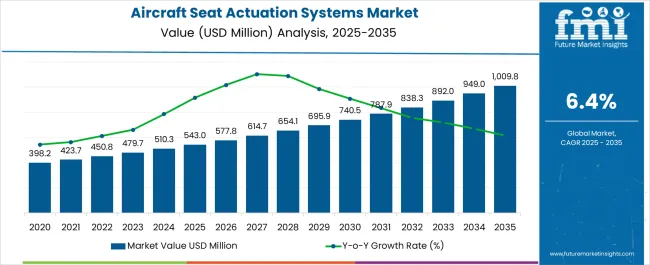
| Metric | Value |
|---|---|
| Aircraft Seat Actuation Systems Market Estimated Value in (2025 E) | USD 543.0 million |
| Aircraft Seat Actuation Systems Market Forecast Value in (2035 F) | USD 1009.8 million |
| Forecast CAGR (2025 to 2035) | 6.4% |
The aircraft seat actuation systems market is witnessing steady expansion, supported by the rising demand for enhanced passenger comfort and increasing air travel volumes globally. Airlines are prioritizing cabin upgrades to differentiate services, leading to growing integration of advanced actuation systems across multiple seat categories.
Technological progress in electromechanical actuators and intelligent control systems is enabling smoother seat adjustment, lower noise levels, and improved durability, all of which contribute to a superior passenger experience. Regulatory emphasis on safety and energy efficiency is also influencing product development, as manufacturers focus on lighter and more reliable systems that reduce overall aircraft weight and fuel consumption.
The market outlook is further strengthened by the growing fleet modernization programs across commercial aviation, where seating comfort and flexibility are being recognized as essential elements of customer satisfaction With demand from both premium and economy cabins, the industry is expected to benefit from continuous investments in next-generation aircraft interiors and a broader focus on operational efficiency, driving consistent long-term growth.
The aircraft seat actuation systems market is segmented by seat type, mechanism type, and geographic regions. By seat type, aircraft seat actuation systems market is divided into Economy Class, Business Class, and First Class. In terms of mechanism type, aircraft seat actuation systems market is classified into Linear and Rotary. Regionally, the aircraft seat actuation systems industry is classified into North America, Latin America, Western Europe, Eastern Europe, Balkan & Baltic Countries, Russia & Belarus, Central Asia, East Asia, South Asia & Pacific, and the Middle East & Africa.
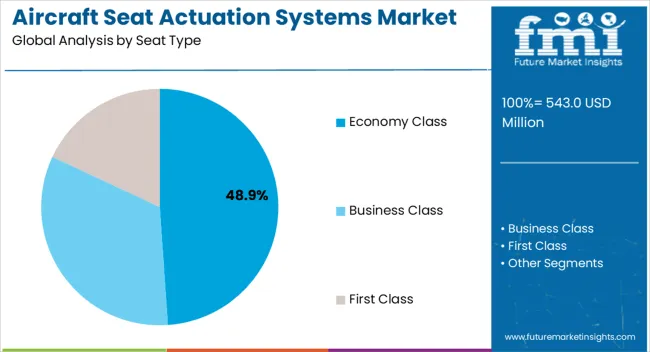
The economy class segment is projected to account for 48.9% of the aircraft seat actuation systems market revenue share in 2025, positioning it as the leading seat type. This dominance is being reinforced by the large proportion of economy seating in global airline fleets, as carriers maximize capacity to meet rising passenger traffic. The demand for enhanced comfort in long-haul economy cabins is prompting airlines to adopt improved seat actuation systems that allow recline, leg rest adjustment, and ergonomic positioning without compromising space efficiency.
Growth in low-cost carriers, which primarily operate with high-density economy layouts, is further contributing to the segment’s prominence. Continuous innovation in lightweight materials and compact actuators is enabling the integration of advanced features while keeping maintenance costs manageable.
Additionally, increasing consumer expectations for comfort even in standard seating categories are influencing adoption The economy class segment is therefore benefiting from both scale and evolving passenger needs, ensuring it retains its leadership position in the market.
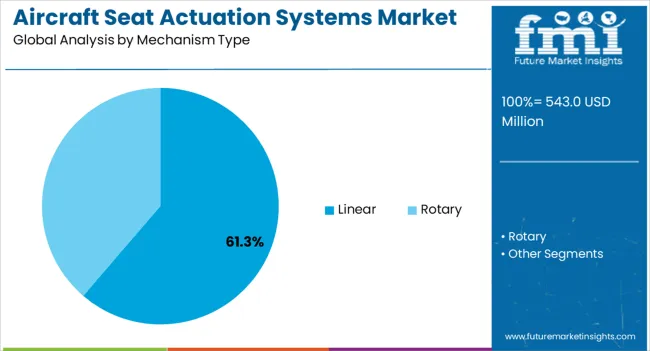
The linear mechanism segment is anticipated to hold 61.3% of the aircraft seat actuation systems market revenue share in 2025, establishing itself as the leading mechanism type. Its dominance is being driven by proven reliability, simplified design, and efficient power usage, which make linear actuators well-suited for aircraft cabin environments. The ability to deliver precise and consistent seat movements, including recline and leg rest adjustments, has made this mechanism the preferred choice for large-scale adoption.
Airlines and manufacturers favor linear systems due to their ease of integration, lower maintenance requirements, and compatibility with lightweight materials that help reduce aircraft fuel consumption. Growing emphasis on passenger comfort and regulatory compliance is supporting further deployment, as linear mechanisms provide a balance of performance and cost efficiency.
Advancements in electromechanical actuator technology are also enhancing durability and reducing noise levels, strengthening their appeal With a strong record of operational reliability and scalability across both premium and economy seating, the linear mechanism segment is expected to sustain its leadership throughout the forecast period.
The market analysis for Aircraft Seat Actuation Systems from 2025 to 2025 exhibited a historical growth rate of 3.6% CAGR. Advances in aircraft seat actuation system design allow greater passenger comfort, leading to the prevention of spinal and cervical pain during extended flights. Seat actuation systems are crucial parts of aircraft cabins, being the primary factor that has driven the market expansion from 2025 to 2025.
According to the most recent FMI analysis, the market is expected to grow at a rate of 6.4% between 2025 and 2035. An increasing number of air travelers indirectly drive demand for seat actuation systems. The increased demand for private aircraft is also projected to drive the aircraft seat actuation system market.
Seat actuation systems enable passengers to modify their seating position to their preference. Increasing disposable income is causing a shift in consumer lifestyle patterns, thus increasing demand for luxury travel. Furthermore, increasing awareness towards ergonomic seat design is positively boosting demand for aircraft seat actuation systems.
Premium flight travel is increasing significantly over the world as disposable incomes rise. Also, positive growth in Aviation Industry is one of the primary factors driving the market. The increased requirement for aircraft maintenance and retrofitting is also surging the industry.
Aircraft manufacturers are actively spending on research and development (R&D) initiatives to optimize the effectiveness, capacity, and intelligence of aircraft seat actuation systems in order to provide passengers with a comfortable and luxurious flying experience. Manufacturers are also working to reduce the aerial vehicle's basic operating empty weight (OEW) by using lighter equipment, which is anticipated to impel the growth of the market.
The market for aviation seat actuation systems is likely to be driven by increased demand for high-tech seats as a result of improvements in seat technology such as motion control, self-adjusting aircraft seat actuators, and their low weight. Additionally, the growth of the market for premium seats with seat actuators is expected to be a significant factor driving the global aircraft seat actuation system market.
Commercial airlines are expensive, with significant maintenance expenses, preventing industry players from putting in substantial airline orders. Macroeconomic difficulties and sluggish economic growth are impacting the airline industry, reducing demand for aircraft seat actuation systems.
Low-frills planes are projected to hinder industry expansions since passengers prefer affordable and less expensive modes of transportation. As a result, many airlines ignore the requirement for sophisticated in-flight luxury facilities and features, impacting the demand for aircraft seat actuation systems.
The cost of manufacturing the Aircraft seat actuation system is high. The aircraft seat actuation system is more expensive than conventional aircraft seats. Due to the high cost of these seats, most airline companies that build planes only use them in the luxury class segments. Another factor that is predicted to impede the global market of aircraft seat actuation systems is the cost of installation.
The business class segment of the aircraft seat actuation systems market is anticipated to exhibit its dominance over the forecast period, aided by the improved standard of living of consumers in developing countries like China and India. North America is the second-biggest market for aircraft seat actuation systems, with Europe holding the largest market share.
The global aircraft seat actuation systems market is predicted to grow at a high pace year over year in growing regions like the Asia Pacific, while the leading markets are projected to grow at a moderate rate.
The market for aircraft seat actuation systems is growing at a modest rate in regions like Latin America, the Middle East, and Africa. The high growth of air travel passengers around the world is anticipated to support the substantial expansion of the global aircraft seat actuation system market over the forecast period.
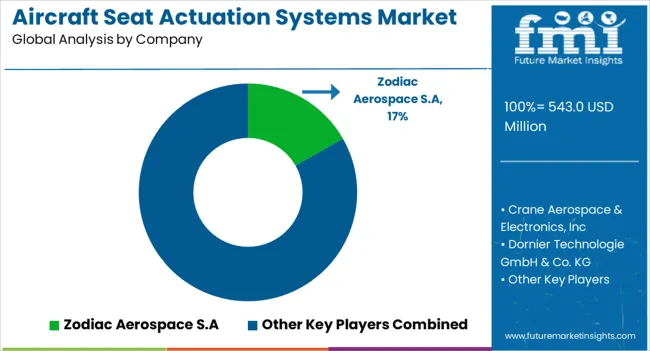
Key players operating in the Dornier Technologie GmbH & Co. KG, Zodiac Aerospace S.A, Buhler Motor GmbH, Rollon S.P.A, Almec EAS Ltd, Nook Industries, Crane Aerospace & Electronics Inc, ITT Corporation, AirWorks, Inc, Elektro-Metall Export GmbH, PGA Electronics S.A.
To build a strong position in the Aircraft Seat Actuation Systems market, key market players are boosting, and expanding sales and distribution networks, product differentiation and new product development, and strategic alliances and partnerships.
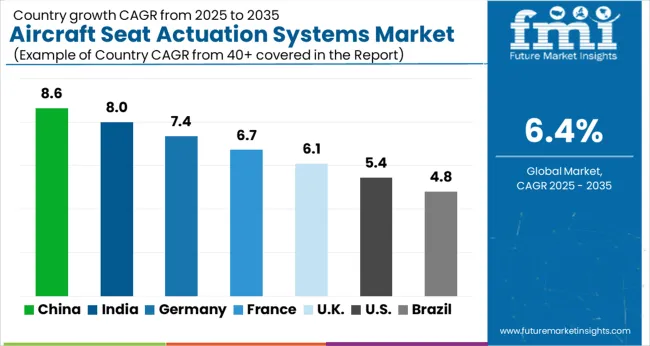
| Country | CAGR |
|---|---|
| China | 8.6% |
| India | 8.0% |
| Germany | 7.4% |
| France | 6.7% |
| UK | 6.1% |
| USA | 5.4% |
| Brazil | 4.8% |
The Aircraft Seat Actuation Systems Market is expected to register a CAGR of 6.4% during the forecast period, exhibiting varied country level momentum. China leads with the highest CAGR of 8.6%, followed by India at 8.0%. Developed markets such as Germany, France, and the UK continue to expand steadily, while the USA is likely to grow at consistent rates. Brazil posts the lowest CAGR at 4.8%, yet still underscores a broadly positive trajectory for the global Aircraft Seat Actuation Systems Market. In 2024, Germany held a dominant revenue in the Western Europe market and is expected to grow with a CAGR of 7.4%. The USA Aircraft Seat Actuation Systems Market is estimated to be valued at USD 206.1 million in 2025 and is anticipated to reach a valuation of USD 350.1 million by 2035. Sales are projected to rise at a CAGR of 5.4% over the forecast period between 2025 and 2035. While Japan and South Korea markets are estimated to be valued at USD 26.6 million and USD 15.0 million respectively in 2025.
| Item | Value |
|---|---|
| Quantitative Units | USD 543.0 Million |
| Seat Type | Economy Class, Business Class, and First Class |
| Mechanism Type | Linear and Rotary |
| Regions Covered | North America, Europe, Asia-Pacific, Latin America, Middle East & Africa |
| Country Covered | United States, Canada, Germany, France, United Kingdom, China, Japan, India, Brazil, South Africa |
| Key Companies Profiled | Zodiac Aerospace S.A, Crane Aerospace & Electronics, Inc, Dornier Technologie GmbH & Co. KG, Buhler Motor GmbH, Rollon S.P.A., ITT Corporation, Elektro-Metall Export GmbH, PGA Electronics S.A., Almec EAS Ltd., Nook Industries, and AirWorks, Inc |
The global aircraft seat actuation systems market is estimated to be valued at USD 543.0 million in 2025.
The market size for the aircraft seat actuation systems market is projected to reach USD 1,009.8 million by 2035.
The aircraft seat actuation systems market is expected to grow at a 6.4% CAGR between 2025 and 2035.
The key product types in aircraft seat actuation systems market are economy class, business class and first class.
In terms of mechanism type, linear segment to command 61.3% share in the aircraft seat actuation systems market in 2025.






Our Research Products

The "Full Research Suite" delivers actionable market intel, deep dives on markets or technologies, so clients act faster, cut risk, and unlock growth.

The Leaderboard benchmarks and ranks top vendors, classifying them as Established Leaders, Leading Challengers, or Disruptors & Challengers.

Locates where complements amplify value and substitutes erode it, forecasting net impact by horizon

We deliver granular, decision-grade intel: market sizing, 5-year forecasts, pricing, adoption, usage, revenue, and operational KPIs—plus competitor tracking, regulation, and value chains—across 60 countries broadly.

Spot the shifts before they hit your P&L. We track inflection points, adoption curves, pricing moves, and ecosystem plays to show where demand is heading, why it is changing, and what to do next across high-growth markets and disruptive tech

Real-time reads of user behavior. We track shifting priorities, perceptions of today’s and next-gen services, and provider experience, then pace how fast tech moves from trial to adoption, blending buyer, consumer, and channel inputs with social signals (#WhySwitch, #UX).

Partner with our analyst team to build a custom report designed around your business priorities. From analysing market trends to assessing competitors or crafting bespoke datasets, we tailor insights to your needs.
Supplier Intelligence
Discovery & Profiling
Capacity & Footprint
Performance & Risk
Compliance & Governance
Commercial Readiness
Who Supplies Whom
Scorecards & Shortlists
Playbooks & Docs
Category Intelligence
Definition & Scope
Demand & Use Cases
Cost Drivers
Market Structure
Supply Chain Map
Trade & Policy
Operating Norms
Deliverables
Buyer Intelligence
Account Basics
Spend & Scope
Procurement Model
Vendor Requirements
Terms & Policies
Entry Strategy
Pain Points & Triggers
Outputs
Pricing Analysis
Benchmarks
Trends
Should-Cost
Indexation
Landed Cost
Commercial Terms
Deliverables
Brand Analysis
Positioning & Value Prop
Share & Presence
Customer Evidence
Go-to-Market
Digital & Reputation
Compliance & Trust
KPIs & Gaps
Outputs
Full Research Suite comprises of:
Market outlook & trends analysis
Interviews & case studies
Strategic recommendations
Vendor profiles & capabilities analysis
5-year forecasts
8 regions and 60+ country-level data splits
Market segment data splits
12 months of continuous data updates
DELIVERED AS:
PDF EXCEL ONLINE
Aircraft Seat Market Size and Share Forecast Outlook 2025 to 2035
Aircraft Seating Market Size and Share Forecast Outlook 2025 to 2035
Aircraft Seat Frames Market
Aircraft Fuel Systems Market Size and Share Forecast Outlook 2025 to 2035
Aircraft Galley Systems Market Size and Share Forecast Outlook 2025 to 2035
Aircraft Washing Systems Market Analysis - Size, Share & Forecast 2025 to 2035
Aircraft Communication Systems Market
Automotive Seating Systems Market Analysis - Size, Share & Forecast 2025 to 2035
Automotive Brake Actuation Systems Market Size and Share Forecast Outlook 2025 to 2035
Commercial Aircraft Video Surveillance Systems Market Growth - Trends & Forecast 2025 to 2035
Digital Glass Military Aircraft Cockpit Systems Market Size and Share Forecast Outlook 2025 to 2035
Seatbelt Polyester Yarn Market Size and Share Forecast Outlook 2025 to 2035
Seat Control Module (SCM) Market Forecast and Outlook 2025 to 2035
Aircraft Cabin Environment Sensor Market Forecast and Outlook 2025 to 2035
Aircraft Flight Control System Market Size and Share Forecast Outlook 2025 to 2035
Aircraft Electric Motor Market Forecast Outlook 2025 to 2035
Aircraft Cooling Turbines Market Size and Share Forecast Outlook 2025 to 2035
Aircraft Smoke Detection and Fire Extinguishing System Market Size and Share Forecast Outlook 2025 to 2035
Aircraft Hose Fittings Market Size and Share Forecast Outlook 2025 to 2035
Aircraft Cabin Interior Market Size and Share Forecast Outlook 2025 to 2035

Thank you!
You will receive an email from our Business Development Manager. Please be sure to check your SPAM/JUNK folder too.
Chat With
MaRIA